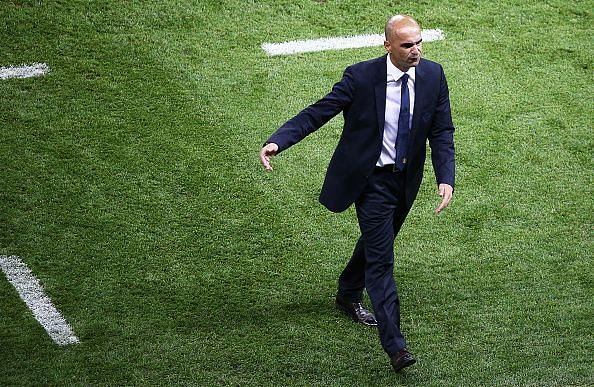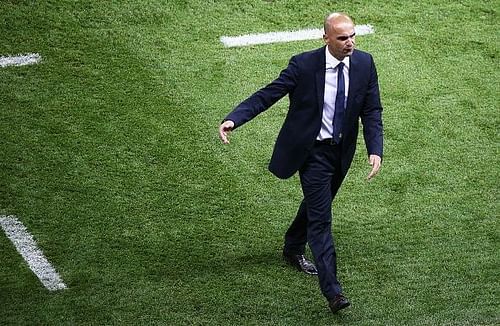
World Cup 2018: How Roberto Martinez plotted Brazil's fall

In what was one of the upsets of the FIFA World Cup 2018, Belgium defeated favourites Brazil in the quarterfinals to send them home. Brazil had 521 passes, 709 touches of the ball, 28 shots, yet could muster only the solitary goal.
But this was no fluke, it was a clever deduction of the Brazilian gameplay by the Belgian camp, which includes the electrifying Thiery Henry. The heap of the credits, quite correctly, should go to Roberto Martinez for plotting the downfall of the 5-time champions.
A change in formation
A lot of eyebrows were raised when Martinez opted to start with the static Marouane Fellaini to partner Axel Witsel and Nacer Chadli in the middle, a sudden change of tactics from the 3-4-3 he had used for the entire tournament to a 4-3-3 for such a crucial match.
Critics were particularly sceptical about the use of Fellaini, a move that seemed to be advantageous to Brazil. Up ahead, it was Romelu Lukaku in the middle with Eden Hazard and Kevin De Bruyne on either side of him. It looked odd, to say the least.
With the onset of the game, the Brazilian midfield was on the critics' case like fire. For the first 15 minutes, Belgium looked nervous to say the least. But that would change gradually.
Slowly Martinez's tactics began to show. Lukaku was not the centre point of the attack, he took his position on the right side, as a right forward. Hazard stayed to the left and De Bruyne played as a false 9.
This had two tactical effects on the game. The marauding Brazilian full-backs, one of the strengths of Tite's system, were initially a little cautious going forward. The second was that it used the trickery of Hazard, the precision and vision of De Bruyne and the power and pace of Lukaku to devastating effects in the counter attacks.
In fact, at one time in the game, it did look like Belgium would put in more than just a couple of goals inside the Brazilian net. But poor finishing almost made them pay.
The first goal was a lucky break that Belgium probably deserved. The second was a menacing display of the power this team held in counter-attack. But the main battle was won and lost (for Brazil), in the midfield. The Brazilian midfield of Fernandinho, Coutinho and Paulinho often crowded each other and ran into each others' space. They were guilty of complicating things.
The Belgian midfield, on the other hand, kept things simple. They had 150 touches on the ball to Brazil’s 219. Fellaini had 52 touches on the ball, Chadli had 42. But Axel Witsel was just what the doctor prescribed for Belgium. He was a revelation on the pitch. He had 56 touches on the ball and like his midfield partners, did not hold on to the ball more than it was necessary.
Keeping things simple
The Belgian game plan had two agendas – keep it simple and pass the ball to the talented forwards. Fellaini, surprisingly, did not venture into the opposition penalty area much in open play, with just a solitary effect on goal deflected off for a corner. Instead, he concentrated on providing steel to the right side of midfield, helping Thomas Meunier handle Neymar with ease.
Fellaini was utilized to provide toughness in the middle and stir up the silky Brazilians. He held up the ball well, receiving it quite a few times on his chest and proceeded to pass it on and hold the fort. He won 7 aerial duels, and Fernandinho and Paulinho had no answer for him.
Chadli concentrated mostly on the wings, and Coutinho will not forget him in a hurry. Coutinho had 96 touches on the ball to Chadli’s 42, but Chadli ensured that apart from that one assist, the former was largely rendered ineffective. Fernandiho, with 78 touches, had time on the ball that he could not use and on many occasions, the speed of the Belgian counter made Brazil miss the destructive powers of Casemiro.
Both Fellaini and Chadli ensured that the Brazilian midfield could not operate with their customary flair, but the most vital piece of the puzzle was Axel Witsel.
Witsel had just 56 touches on the ball, but he roamed around the middle of the pitch like a man possessed. He was everywhere and sometimes you had to wonder if there were two of him playing. More than once, Witsel was there in the box to clear away dangerous balls before it could reach a Brazilian foot.
Fernandinho's bad day at the office
For the first 15 minutes, Fernandinho seemed to have an upper hand over him, but Witsel came back strong and continued to dominate proceedings. He had an impressive 89% pass completion rate, with 38 attempted passes, 34 of them being accurate.
Surprisingly, Fernandinho attempted more passes, however, there was one more area where he let Brazil down. Fernandinho had a possession percentage of 7.1 to Witsel’s 4.1. Both Fellaini (3.6%) and Chadli (2.9%) had lower possession, which meant they held on to the ball much less, preferring, instead to keep the ball rolling and move it forward.
Brazil had 239 passes in the final third. Belgium had only 97. They had not over complicated things, attempting to move the ball forward at speed and relying on direct counter attack. It was a stark contrast to the Brazilian game plan.
But it was not just Martinez's tactics alone that ensured victory for Belgium. They were riding their luck on numerous occasions and it was only some last ditched defending and some poor finishing that kept them in the game. Luck was definitely a factor, but then even Champions require luck once in a while and Belgium had deserved their luck as the statistics showed.
Belgium's dogged defence
In the whole game Fernandinho attempted just 1 tackle, same as Witsel but Fellaini attempted 3. Neymar was dispossessed 5 times, Hazard only thrice. The Brazilian defence had 6 tackles, the Belgian defence had 11. Brazil had attempted 28 tackles in the whole game, to Belgium's 26. But Belgium were ruthless in defence as in attack.
Of the 26 attempted tackles, only 2 were in the opposition half, 9 were inside the penalty box and 15 in their own half. Belgium did not go chasing for the ball in the opposition, they waited instead, preferring to soak in the pressure, confident of their abilities. But it was not just tackling, but blocks as well. Belgium had 26 blocks – 10 at the edge of the Penalty box, 10 inside the penalty box, and the rest in the opposition half. Brazil had only 6.
Belgium had an astounding 27 clearances – 25 from the penalty box and 2 from the edge of the box. They also won 18 aerial battles to Brazil's 12.
Tite made a few changes as the game wore on and the arrival of Douglas Costa stretched the game for the Brazilians, as they threw the kitchen sink at Belgium. Brazil had a total of 4 attempts in the 6-yard box, 12 shots in the penalty box, but apart from the Renato Augusto goal, which was a momentary lapse of concentration from Vincent Kompany, Belgium held on.
And for that, along with their defence, they also had the brilliance of their goalkeeper to be thankful for. Courtois made 9 saves including a flying save to keep out a trademark Coutinho shot and in the dying minutes of the game and a stunning one to deny a Neymar attempt that was destined for the top right corner.
In the end, the Golden Generation of Belgium knocked the favourites out of the World Cup in a stunning display of tactical football, where the whole team played as a unit, with clear instructions that were followed to the book.
Martinez's redemption
Roberto Martinez deserves all the credit coming his way, not just for this game, but also for an inspiring life lesson as well. Only a couple of years back, in May 2016 he was sacked as a manager of Everton.
Two years on, he has masterminded the downfall of mighty Brazil and brought a talented Belgium team to the cusp of glory. Football has provided him a chance at redemption, a shot at legendary status and with this efficient Belgium team to back him up, you would not bet against him.